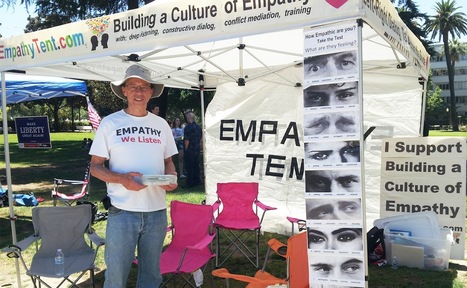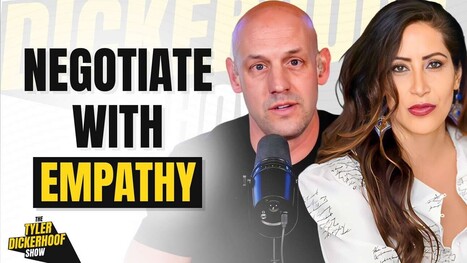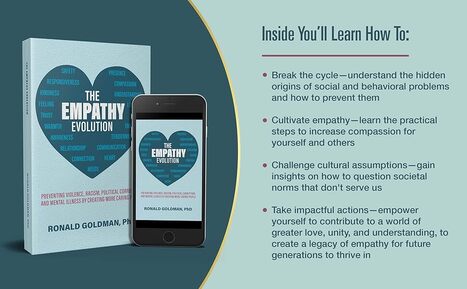 Your new post is loading...
 Your new post is loading...

|
Rescooped by
Edwin Rutsch
from Compassion
September 28, 2024 3:35 PM
|

|
Scooped by
Edwin Rutsch
May 20, 9:02 PM
|
Research from Wharton professor Rebecca (Becky) Schaumberg and PhD student Zhiying (Bella) Ren reveals how disagreement in a conversation is often mistaken for bad listening, regardless of how engaged the listener is. Schaumberg explains their findings.

|
Scooped by
Edwin Rutsch
May 20, 7:45 PM
|
It appears the world order is changing at a rapid clip. Shared values such as respect, honor, and truth-telling have been figuratively shredded in a wood chipper. Empathy is considered, by some powerful figures, to be an obstacle to success.
According to Buddhist teaching, to show compassion, the close cousin of empathy, is the purpose of life. Shared compassion lessens misery and suffering. When it comes to conducting sustainable business practices, having a compassionate conscience, despite what some billionaires might say, still matters.

|
Scooped by
Edwin Rutsch
May 19, 9:55 PM
|
Summary: While AI companions are marketed as a fix for loneliness, research shows that reading offers far more meaningful benefits. Reading fiction can foster social connection, reduce stress, enhance empathy, and even reshape brain activity linked to social cognition.
Shared reading and book clubs have been shown to reduce loneliness and improve mental health, especially among young adults and older populations. Unlike digital interactions, reading activates brain regions involved in understanding others, offering a powerful, low-tech solution to modern social isolation.
Key Facts:
Social Brain Boost: Reading fiction activates brain areas tied to empathy and connection.
Mental Health Aid: Readers report less loneliness, better sleep, and lower stress.
Protective Effect: Frequent reading is linked to a lower risk of dementia and cognitive decline.

|
Scooped by
Edwin Rutsch
May 19, 6:18 PM
|
“Empathy has never started a war, never sought to take the dignity of others, and empathy teaches you that power is interchangeable with another word, responsibility.”

|
Scooped by
Edwin Rutsch
May 19, 3:50 PM
|
- Examining the empathy levels of medical students using CHAID analysis
- The role of maternal sensitivity, infant temperament, and emotional context in the development of emotion regulation
- The implications of COVID-19 for employee health: the moderating roles of perceived government benevolence, leader empathy, and family centrality
- Mediating role of emotional intelligence in the relationship between dual work stress and reflective ability among junior nurses
- The Experiences, Enablers and Barriers of Compassion According To Residential Youth Care Workers in the Netherlands
- State Self-Compassion and Response to Failure: The Mediating Role of Causal Attributions

|
Scooped by
Edwin Rutsch
May 19, 3:15 PM
|
When adults pretended to be in pain, children as young as 9 months old comforted them, pushing back the earliest age when humans are known to display empathy

|
Scooped by
Edwin Rutsch
May 19, 2:50 PM
|
Commencement speaker Emily Deschanel (CFA’98) urged BU graduates Sunday to be empathetic. “Empathy,” she told the approximately 25,000 gathered on Nickerson Field, “makes people feel seen, heard, and known. It creates an environment of respect and care.”
“Empathy isn’t weakness,” she told the 4,000 graduates and more than 20,000 guests gathered on Nickerson Field, as well as an overflow crowd at nearby Agganis Arena, on a cloudy and windy afternoon that sprinkled light rain briefly during her remarks. (The full Class of 2025, including those who did not attend Sunday’s ceremony, totals almost 8,000.)

|
Scooped by
Edwin Rutsch
May 15, 12:13 PM
|
by Kieran Donaghy,
This paper aims to show that empathy is central to successful language learning and to making language teaching a more compassionate and fairer profession. I begin by exploring what empathy is, its three main components: cognitive empathy; affective empathy and empathetic concern, and its neurological foundations.
I draw on general education literature to present what research findings suggest about the role of empathy in education and the characteristics of empathic teachers. I then draw on language education literature and research to support my argument that empathy is particularly important in language education. I examine whether there is an empathy deficit in language teaching and look at hindering factors that may make it challenging to embed a culture of empathy in the profession.
Finally, moving from theory to practice, I explore how we could explicitly develop empathy as a skill among teacher trainers, teachers and learners.

|
Scooped by
Edwin Rutsch
May 14, 2:20 PM
|
When
Day 1: Monday, May 19, 2025, 11 a.m. - 3 p.m. (UTC-04:00) Eastern Time (US & Canada)
Day 2: Wednesday, May 21, 2025, 11 a.m. - 3 p.m. (UTC-04:00) Eastern Time (US & Canada)

|
Scooped by
Edwin Rutsch
May 12, 12:04 PM
|
When you think of workplace wellness, you may picture gym memberships and yoga mats. But joy, empathy, and inclusion also create a healthy and high-performing workplace culture! We need to reimagine what wellness means!
Today, Misha Safran, shares how empathy intersects with inclusion to foster innovation and equity. We also discuss how to reframe the misconceptions about empathy that exist in high-pressure workplaces. With brilliant mindset shifts and practical tips, she shares how leaders can model empathy without feeling performative, and how to navigate conflict using empathy and emotional intelligence. Misha shares the four elements of joy and why you can be more successful when you embrace them so your team can break free from chaos and transform that energy into creativity, problem-solving, and success.
To access the episode transcript, please scroll down below.
Key Takeaways:
Empathy is love, care, and concern – not agreement. It’s having conversations, it’s listening to know what’s going on, and it’s having healthy boundaries.
Empathy before accusation.
Empathy might look different depending on personality – it doesn’t have to mean being touchy-feely or crying on the floor with your employees.
Especially in conflict, urgency causes chaos – slow down, take a pause, take a breath, and respond, don’t react. Slow down to build up.

|
Scooped by
Edwin Rutsch
May 11, 8:45 PM
|

|
Scooped by
Edwin Rutsch
May 11, 8:42 PM
|
Background Medical curriculum development rarely involves patients, educators, and students, meaning that key stakeholders' voices are not adequately represented in curricular content. In this paper, we describe the co‐production of an empathy‐focused medical curriculum involving patients, educators, and students. Approach We adopted the National Institute for Health Research co‐production principles to develop three curriculum streams: 1) delivering evidence‐based empathy lectures, 2) involving patients in biomedical science teaching, and 3) implementing longitudinal empathic communication and clinical skills teaching. Patients, educators, and students were purposefully sampled from one medical school. At least one co‐production workshop was conducted for each curriculum stream, combined with written engagement.
|

|
Scooped by
Edwin Rutsch
May 20, 9:23 PM
|
What Is Empathy, Anyway?
Empathy is a broad term that can mean a lot of different things in different contexts. “The empathy we often think about is sharing in another person's feelings,” Daryl Cameron, PhD, says. “So if I see someone, or read about someone who's sad, I catch that sadness myself, and I'm in the same emotional place.”
Cameron is an associate professor of psychology at Pennsylvania State University whose research explores the psychology behind empathy and how it guides our decisions. He explains that empathy is sometimes conflated with sympathy, which is when you see that someone else is suffering and your instinct is to help them. It can also get mixed up with “perspective taking,” a theory that describes the human ability to understand what another person is going through without sharing their emotional response—like acknowledging why the fans of a rival sports team are sad because they lost, while also celebrating your own victory.

|
Scooped by
Edwin Rutsch
May 20, 7:45 PM
|
Maria Ross, an IU Kelley School of Business graduate and author, emphasizes the importance of empathy in both personal and professional settings as a key to thriving in a divided world.
Ross, known for her expertise in strengthening empathy at work, aims to help individuals practice healthy empathy in their personal lives. Her book, “The Empathy Dilemma,” outlines five pillars of effective empathy, offering guidance on understanding and compassion.
“Empathy is about being able to see, understand, and where appropriate feel another person’s perspective,” Ross explained. “It doesn’t necessarily mean you’re crying on the floor with your employees. It’s just a method of information gathering to try to understand where someone else is coming from.”

|
Scooped by
Edwin Rutsch
May 20, 7:43 PM
|
Empathy that connects, that builds, that heals requires a code of ethics. It requires restraint. It requires trust. It asks the empathizer not just to understand others but also to honor what that understanding unlocks. When empathy becomes unmoored from ethics, it becomes coercion with a smile.
We see this now with artificial intelligence, where systems are increasingly trained to simulate empathic responses. Your chatbot apologizes for your frustration, your virtual assistant offers saccharine encouragement, your mental health app listens without judgment. But none of these systems feel anything. They just know what to say. We’re entering a world where “empathetic” algorithms outperform our managers at recognizing distress but lack a moral compass to decide what to do with it. And if we aren’t careful, we’ll soon mistake performance for presence. In doing so, we outsource not just emotional labor but our emotional responsibility to one another.

|
Scooped by
Edwin Rutsch
May 19, 6:19 PM
|
Stanford law Professor Norm Spaulding shares six tips for understanding what your conversation partner is trying to convey, inspired by advice from the nonprofit organization Center for Creative Leadership.
1. Pay full attention
“Being able to give full attention is just an incredible gift to humanize the person you’re communicating with, and that alone can sometimes have a de-escalating effect,” Spaulding said. To show you are paying attention, nonverbal cues also matter. Some of the ways people can demonstrate they are engaged include nodding, maintaining eye contact, and removing distractions.

|
Scooped by
Edwin Rutsch
May 19, 3:52 PM
|
When I started the rigorous work of personal development in 2018, I stumbled upon the idea that empathy was the secret sauce.
The antidote to insecurity-driven compensations of personality, demeanor, and actions.During this period, a coach helped develop the “Empathy Spectrum.” At one end was where I had lived and survived, the A-hole. At the other extreme, I saw people who excessively poured empathy on others, being overly compassionate, forgiving, sympathetic, etc., the Doormat. Each acts with empathy. The A-hole has little empathy and fears that vulnerability and authenticity will be their demise. The doormat is fearful that if they don't let others walk all over them, use them, be enabled by them, or show them praise, the offender will dispense with them.

|
Scooped by
Edwin Rutsch
May 19, 3:33 PM
|
The United States is plagued with serious and deep-seated societal issues, and ranks behind over 20 other nations in happiness and quality of life. In The Empathy Evolution, Dr. Ronald Goldman delivers a profound and timely exploration of our ongoing struggles with violence, racism, political corruption, and mental illness. Filled with insightful analysis, practical solutions, and a call for societal transformation, the book has recently become a #1 Amazon Bestseller.
Based on compelling evidence from the human development sciences, The Empathy Evolution delves into the actual origins of these problems. Their roots lie with commonly repeated, yet overlooked, early life experiences. Improving these early childhood experiences is the key to improving both personal and societal welfare and quality of life.
Dr. Goldman’s book challenges readers to rethink cultural assumptions and take action to create a more compassionate and unified nation. By embracing the concepts of empathy, readers are empowered to improve the quality of their own lives while contributing to a larger societal transformation.

|
Scooped by
Edwin Rutsch
May 19, 3:15 PM
|
The phenomenon of empathy decline among medical students during training is widely accepted, with evidence based largely on studies using self-administered instruments. Recently, researchers have called into question this phenomenon, in light of new findings that suggest a discrepancy between self-administered empathy scores and observed empathic behaviours: for example, during objective structured clinical examinations (OSCEs). Our objective was to compare observed empathy among medical students in different clerkship years using an OSCE.

|
Scooped by
Edwin Rutsch
May 19, 2:30 PM
|
“To seek solutions to global problems is not a zero sum game where your nation loses, that upholding a rules based order is not nostalgic or of another era, and crucially, that in this time of crisis and chaos, leading with empathy is a strength.
“There are some who say that empathy is some kind of threat to Western civilisation. There is much I could say to that claim.
“Instead, I will just say this: empathy has never started a war, never sought to take the dignity of others, and empathy teaches you that power is interchangeable with another word: responsibility.”

|
Scooped by
Edwin Rutsch
May 14, 5:33 PM
|
Have you ever sensed someone’s emotions before they’ve said a word? As spring blossoms around us this May, it’s the perfect time for self-discovery and personal growth. Recent research in psychology reveals that empathic personalities often go unrecognized—even by themselves. While some people openly identify as empaths, many others possess these qualities without realizing how unique their emotional sensitivity truly is. As a clinical psychologist, I’ve observed that these individuals often feel different without understanding why.
THE SCIENCE BEHIND EMPATHIC PERSONALITIES
Empaths experience emotions differently than others. As psychiatrist Dr. Judith Orloff explains, “Empaths are naturally giving, spiritually open, and good listeners.” The neurological basis involves heightened mirror neuron activity, allowing empaths to essentially “feel” others’ emotions as their own. This emotional absorption can be both a gift and a challenge, especially during socially demanding spring activities that follow winter’s isolation.

|
Scooped by
Edwin Rutsch
May 12, 8:17 PM
|
A colleague shared with me a photo of a Post-it note with the words “Become Empathy Machines!” scrawled on it, taken at the Third Coast International Audio Festival in Chicago on Nov. 4, 2016.[1] It was two days after the stunning election of Donald Trump, and one of the podcasters or producers or radio journalists had written this message in response and pasted it to a wall as part of a makeshift Post-it note mural that sprang up to collect reactions and to identify ways forward in a country that suddenly seemed strange.

|
Scooped by
Edwin Rutsch
May 12, 12:00 PM
|
Shermin Kruse is here to talk to us about her latest book, Stoic Empathy. She shares what stoic empathy means and how the fusion of these seemingly opposing forces is particularly relevant today. She shares her personal story and how her immigrant journey shaped her understanding of empathy and stoicism. Sher also talks about how she leveraged stoic empathy as a lawyer to great success. We discuss practical tools for building influence and emotional regulation that you can start using today with your employees – or your partner or kids!
Whether you’re a corporate leader, educator, parent, or simply seeking tools to navigate personal and professional challenges with integrity, you will love this conversation!

|
Scooped by
Edwin Rutsch
May 11, 8:44 PM
|
The world would be a better place if we had more empathy for one another. The more you learn about another’s history and burdens, the better you can understand why they act the way they do. Perhaps the adage is true that to know all is to forgive all. Compassion springs from understanding, and understanding from identifying with the other, and somehow finding yourself in the other and the other in yourself.

|
Scooped by
Edwin Rutsch
May 11, 8:38 PM
|
Purpose Empathy can be divided into cognitive empathy (CE) and affective empathy (AE). CE is defined as the accurate understanding and appropriate response to others’ thoughts whereas AE is defined as the accurate understanding and appropriate response to others’ emotions. The overall purpose of this systematic review and meta-analysis is to assess the effectiveness of empathy interventions in physicians and physicians-in-training in increasing CE and AE. Specifically, we are interested in examining whether specific teaching methods and intervention designs may contribute to greater empathy intervention effectiveness for CE and AE outcomes. Method Studies searched included randomized controlled trials conducted between 1971 to 2022 examining empathy interventions for medical students and physicians. Thirty-six studies, consisting of 3,833 participants, met the inclusion criteria. Data were analysed using random-effects pairwise meta-analysis. Results Empathy interventions have moderate effect sizes on both CE [d = .50 (95% CI = .30, .70)] and AE [d = .46 (95% CI = .30, .62)]. Heterogeneity of effects was evident for both analyses.
|






 Your new post is loading...
Your new post is loading...




























